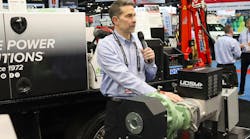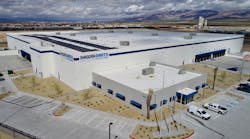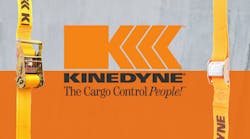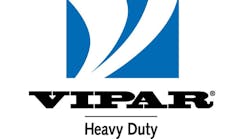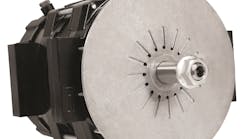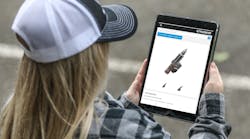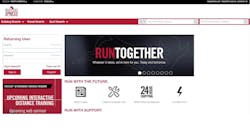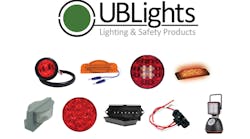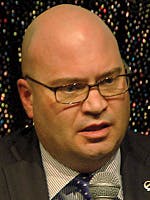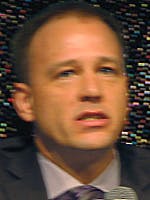The farther you get from the internal core of the engine, the more likely it is that fleets will use private-label parts, according to Stu MacKay, president of MacKay & Company.
MacKay said that based on his company’s 2016 survey, 78% of fleets use OE parts for the internal engine, but that falls to 66% for the transmission and decreases steadily to 44% for axles.
“My takeaway is that this is, and always will be, a branded industry, but private brands have carved out a meaningful segment in the aftermarket,” said Hugh Charvat, CEO of AP Exhaust. “They also are an essential part of the strategy of parts sellers going forward.”
Charvat: When private brands first appeared in the HD aftermarket, they were thought of by price or value. How has that perception changed, and why has it changed?
Eppes: I think there is a common perception—and maybe one that is well-deserved—that it is a value liner or a good/better/best. But one of the things I look at with our offering is, why are we in the private brand business? A big piece of that is really to represent the entire service experience, whether that’s through our dealer network face-to-face or through our online channel.
Danforth: It’s important that it’s not a short line. Customers want the full line of product. Especially to see value in the name and what you represent and what you can help the customer with. They expect you to be able to deliver on everything.
Charvat: Is there any truth to the notion that there are certain systems or systems of vehicles where maybe a shorter private brand offering might make sense where there are other systems? If there is differentiation by system, what does it look like?
Chenier: I think it depends on the repair event. Certainly we want to be comprehensive when looking at our offering. If we were to have a shorter offering, it would be something that wasn’t systems-related, so the long-term approach is to have depth and breadth in the offering on the more complex repair events. We would have a shorter offering where we’re offering just a few parts numbers.
Danforth: Like batteries for us. The PACCAR genuine battery, the TRP battery, which is great. It’s right between that good/better/best product slot.
Charvat: In terms of good/better/best, what would you slot into the best category? Would that be the OE-branded product or possibly a PACCAR-branded product?
Danforth: Proprietary product. Truly designed for the product by us from a technical standpoint with the supplier.
Charvat: What are those up-and-coming categories where you think a private brand would be best-positioned for growth?
Eppes: I’d say what we see right now is a lot on the emissions side. We see a higher technology product. People are looking for ways to try to save money. We see more and more solutions coming to the market in that space. Definitely exhaust, aftertreatment, and electronics.
Charvat: Mike, you look across the various product categories that Rush services, and you cover a plethora of different types of vehicles—a Class 2 all the way up to Class 8 in vocational applications. What are those attributes you look for where you say, “We think there might be opportunity for a private label or expand private label”?
Eppes: We certainly get the customer asking for certain products, asking for help where they see a need. They’ve encountered something that’s costing them more money. They’re looking for alternatives. We get a lot of feedback from customers. We can see what price we’re selling. It truly becomes a business standpoint, a revenue and profit standpoint, for us to expand profit. With that is looking at data and finding those opportunities, and benchmarking them back to the industry and looking for a solution. Sometimes private brands become the solution. Other times there’s another solution that can fill that need just as easily.
Charvat: Why does a vehicle OEM create a separate brand for parts? Is it an attempt to get vehicle competitor parts sales or decrease third-party parts sales?
Chenier: There’s a commercial piece to it. In our case, we have vehicles that last 25 years in certain applications. So for zero to 25 years, we have to be relevant and support that customer. So part of it is the perception of this price point that certainly we want to have an offering that allows customers to stay with us for the long term, no matter where they are in that life cycle. There is a misnomer of this second owner. We have first owners who keep their vehicles 15 to 20 years.
Danforth: You have to educate the customer. We have product for second and third owners, and product for other makes of trucks. So it’s important that the customer understands he’s going to get great value, but also be able to service any needs.
Junquera: Most of our customers will have multiple brands of vehicles. This also enables our customers to know that we can sell them the parts to service all of their vehicles, whether it’s International, PACCAR product, Freightliner.
Charvat: Terri, FleetPride doesn’t build trucks. So you don’t have that leverage in having manufacturing plants and building tens of thousands of vehicles. For FleetPride, you have that requirement for balance as to how you handle the relationships with your OE-branded tier one folks and your private brands. How do you manage that balance?
Roseman: Our customers are all once-size-fits-all. Some folks are demanding private label and other folks are demanding only OE. For us, our supplier partners are just that—our partners. So we work with them. In some instances, they’re making our private label for us, and in other cases, we’re doing the private development ourselves. There are a lot of things that go into any kind of business relationship. ♦
